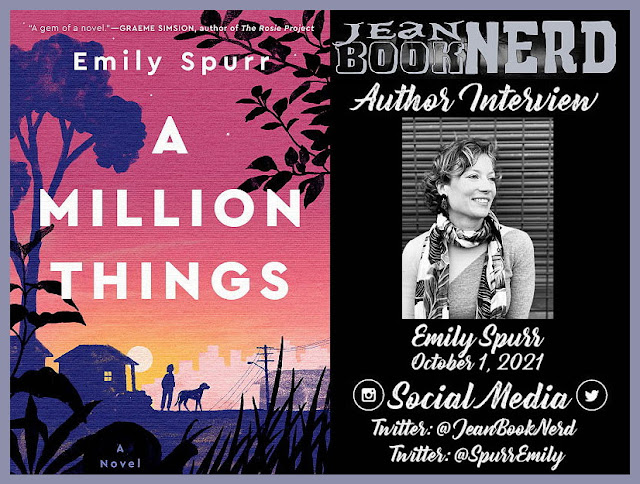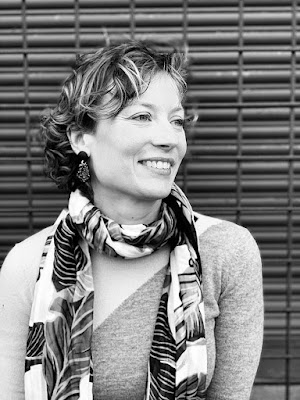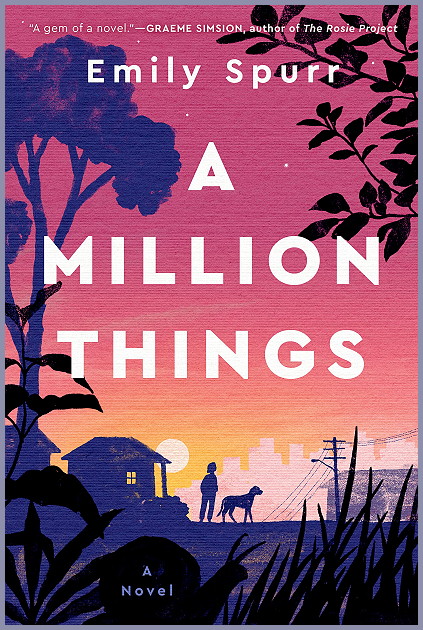Photo Content from Emily Spurr

Why is storytelling so important for all of us?
I think storytelling is central to what it is to be human. It’s how we see through other eyes, how we develop empathy and emotional intelligence. It connects us to others. It’s a practice that’s universal to the human experience, irrespective of culture.
Storytelling is alchemy. It changes knowledge and experience into knowing and understanding, all through language. It enriches our imaginations and our sense of play. It’s instructional and recreational. We can use it to escape and we can use it as a mirror to look more deeply at ourselves. It's magical—it can be worked into almost any shape, for almost any purpose. It is not a perfect thing: it does so much good, but it can hurt too—perhaps because it is created by us and that is what we are capable of also.
In my mind, a life without metaphor and narrative, without storytelling would be a one-dimensional life, a lonely life, that perhaps misses the point. Storytelling has the capacity to make us all better humans.
Tell us your most rewarding experience since being published.
Some of the most rewarding experiences I’ve had since being published are the conversations I’ve had with the people who’ve read my book. Not necessarily about my book (I get a bit awkward and shy when that happens), but about their lives in relation to my book.
People have told me that after reading A Million Things, that they feel they know me somehow, which of course is not true (though on some level, it is). The vulnerability and trust that has been placed in me by some readers has been a privilege; they have revealed pieces of themselves to me in open and honest ways in reaction to my writing, and it’s a reaction that floors me (in the best possible way) every time it happens. To witness that what I wrote connected deeply with someone, someone I’ve never met—it doesn’t get more rewarding than that.
What are some of your current and future projects that you can share with us?
I play those cards quite close to my chest; not to be coy but just because I find when things are still being formed, they can be very fragile, so I prefer not to go into too much detail. That said, A Million Things was published as part of a two-book deal, so there is another book on the way! It’s progressing well. I won’t say much more than that, other than to say the second book deals with quite different ideas to my first.
Can you tell us when you started A MILLION THINGS, how that came about?
The story came from a ‘what if’, as most stories do. It was a personal what if.
In my late teens and for a large part of my twenties I battled mental ill-health. I’ve been well now for a very long time but I still have nightmares about being back in that headspace. Mental illness is a horrific thing to experience, both for the unwell person and those that love them. Even now, many years later, nightmares about that time leave can me rattled for days. It was after one of these nightmares that a question surfaced, which quicky led to others. What if I’d had a child during that period? What would their world have been like? What would that have done to them? Who would they have to be to survive that? And Rae stepped into my head, her small, strong voice speaking to her absent mum.
Of course, it wasn’t as straight forward as that. I wrote another book first, in which I wasn’t confident in my vision. I aged the main character up and did a whole lot of other things that I thought I ‘should’. That manuscript was shortlisted for the Text Prize in Australia, but I wasn’t happy with it and I couldn’t pinpoint why.
It was when talking to a very generous editor at Text Publishing, who took pity on me and invited me out for a coffee and a chat, that I realized why I was unhappy. I had spent so much time worrying who the hell is going to want to read this? That I had changed it into something I felt was more palatable, less dark. This editor asked me what my original idea for the book was. And I told her (fully expecting her to be appalled). She wasn’t. She said something totally unexpected. She said, I’d read that. And with that, I was off. I threw off all the ‘shoulds’ and worries about what people would think, and I wrote my book as I wanted it, confident that at least one person, other than me, would read it. As un unpublished manuscript it was shortlisted for The Victorian Premier’s Literary Prize and the rest, as they say is history.
TEN REASONS TO READ A MILLION THINGS
- 1. You’ll laugh.
- 2. You’ll ugly cry (I’ve been asked to add a warning not to read this book on public transport, or while pretending to work—among other situations.)
- 3. It’s got an awesome dog in it.
- 4. It involves brazen thieving of plants and other items from gardens.
- 5. It’s got a whip-smart, funny, cheeky protagonist.
- 6. It features a friendship that will squeeze your heart.
- 7. Lettie, the 70-something neighbor, friend and powerhouse was described by the Victorian Premier’s Literary Award judges as ‘one of the most fully rendered older women in Australian fiction.’
- 8. It’s a mediation on community and the importance of being vulnerable, especially when we least want to be.
- 9. It’s a story about grief, reliance and hope. It is a dark but ultimately hopeful tale.
- 10. It will break your heart – but in the best possible way.
I hope what they feel when they read my novel is a sense of connection with the characters, with all of them. It’s a book about grief, resilience, vulnerability and the importance of connection and community. All the characters are important and they all have a story, deliberately so. I couldn’t bear for this book to be read as a narrative about a kid whose ‘selfish’ mum abandoned her. Or a titillating tale of a hoarder. I worked hard to present my characters in a fully realized way as much as possible. I couldn’t in good conscience let the complex lives of the people in my book be quirks to make them interesting. Rae’s mum was a good mum, she loved her child fiercely and she did the best she could but it just wasn’t enough. Because sometimes it isn’t. I wanted the tragedy of that to be seen, just as I wanted the complexity of her and Rae’s and Lettie’s situation and characters to be seen, in a three-dimensional way.
That makes it sound a bit grim, doesn’t it? I should add, that for all its darkness, and there is no escaping that this is a dark story, what kept me going writing it (and Rae going living it) was the small moments of joy within it. There were times I laughed out loud while writing Rae and Lettie and Splinter. At least as many times as they made me cry. The novel deals with mental health issues but it is not about mental health issues. It’s about resilience, survival and friendship. There’s plenty of dark, but there is light too, and I hope people feel that when they read it.
What part of Rae did you enjoy writing the most?
All of her. She’s a spikey, funny, cheeky, tough little ball of self-sufficiency with a soft and tender heart. She is a master of hiding vulnerability. There was not an aspect of her I didn’t love writing.
If you could introduce one of your characters to any character from another book, who would it be and why?
I think it would be Rae and Tiffany Aching (from Terry Pratchett’s The Wee Free Men, which, incidentally, is Rae’s favorite book). I think they’d get along very well, though I’d worry a bit for the neighborhood if those two got together… It’s certainly a friendship I’d enjoy witnessing.
TEN RANDOM FACTS ABOUT A MILLION THINGS
- 1. This Australian novel is set in Melbourne’s inner west which is located on the lands of the Wurundjeri Woi Wurrung and Bunurong peoples of the Kulin Nation.
- 2. In its first complete iteration, A Million Things was a YA novel called Black Dog, Small Bird (now firmly consigned to the bottom drawer, never again to see the light of day). Almost none of this story remains in A Million Things, but it is an ancestor to this book (like a dinosaur to a bird).
- 3. The Port of Melbourne in the inner west (the source of all the nighttime banging and crashing that Rae often hears) is the largest port for containers and cargo in Australia – its huge red cranes are affectionally known to locals as the ‘giraffes.’
- 4. A lot of the places in the novel are real places in the inner west, including where Ray orders her pizzas. The names of these pizzas were changed to something more generic at the suggestion of my editor, as the actual pizza names were considered too weird.
- 5. Smell is a very big deal in this novel. I have a very keen sense of smell and smell is a big deal for me too. I enjoyed the challenge of pinning something so ephemeral and elemental into words.
- 6. My friends all immediately know which shop Lettie means by the ‘that fancy shop in Seddon’ where she buys the biscuits (what people in the US would call cookies).
- 7. I never intended Lettie to be a main character in this book. She was just going to be a neighbor who noticed Rae’s comings and goings (as some neighbors do). But she kept appearing, popping up in scenes, kicking her way in with her ugly shoes, until, before I knew what was happening, she and Rae were going on a road trip. It was at this point I was forced to acknowledge that she had become a main character. And I love her all the more for it.
- 8. As an unpublished manuscript. A Million Things was shortlisted for the Victorian Premier’s Literary Awards in 2020.
- 9. Splinter is very obviously (to me) part Irish Wolfhound. I would desperately love to welcome an Irish Wolfhound into my family one day. My partner is less convinced.
- 10. The writing of this novel necessitated a lot of google searches that may have raised some red flags with the Australian Federal Police. Fortunately, as no one died unexpectedly around me during the writing of this book, my google search history remains unexamined. Other than by google, obviously.
No, I’d rather not, but thanks for asking. J
What is something you think everyone should do at least once in their lives?
Something that really scares them. But do this more than once.
Best date you've ever had?
That feels a bit like an oxymoron…. Are any ‘dates’ good? I don’t mean to suggest they are torturous… but so often they are self-conscious awkward affairs where we are so hyper aware of how we are being perceived that we forget to enjoy ourselves. Or is that just me?
I reckon the fun really starts when they stop being ‘dates’ and just become time ‘doing stuff’ together. Usually around the time you have a few in-jokes under your belt and you’ve become comfortable enough that when they point out you’ve got spinach in your teeth (and you then realise, based on when you last ate spinach, it has probably been there all day) it’s funny rather than embarrassing.
Ahem. I mean, it was the first date with my partner, of course. Actually, that was pretty good. I missed the last train home and I couldn’t have cared less.
What was the first job you had?
I was a hospital care assistant when I was about seventeen. The role involved giving patients their meals and a lot of cleaning. It was demanding, physical work and required an iron stomach (which I have). I met someone wonderful people in that job and I learnt a lot.
Which incident in your life that totally changed the way you think today?
I don’t think I could pick one, there have been hundreds of incidents that have changed my thinking in some way - some huge and life shattering and some small but with big impacts. I think some of the most important ways of thinking about things I’ve leant are:
- the more I know the more I have to learn
- joy is a quiet thing that can be found in unexpected places
- the most important things are the most elemental: connection, compassion, empathy and patience – and that some days those are bloody hard but that’s probably when I need them the most (practiced with wildly-varying degrees of success).
In a sad indictment of my life, it was probably watching animals doing stuff on YouTube. (It’s become a late night before-bed-ritual my partner and I have practiced a lot over the last… however long this pandemic has been going on.)
First Heartbreak?
Stung and ached and burned all at the same time. It felt like I’d never be able to catch my breath again.
Which would you choose, true love with a guarantee of a heart break or have never loved before?
True love with a guarantee of a heart break – every time, I reckon. (Made easier by the belief we can have lots of true loves).
A bursting, heartfelt, debut following fifty-five days in the life of ten-year-old Rae, who must look after herself and her dog when her mother disappears.
For as long as Rae can remember, it’s been her and Mum, and their dog, Splinter; a small, deliberately unremarkable, family. They have their walks, their cooking routines, their home. Sometimes Mum disappears for a while to clear her head but Rae is okay with this, because Mum always comes back.
So, when Rae wakes to Splinter’s nose in her face, the back door open, and no Mum, she does as she’s always done and carries on. She takes care of the house, goes to school, walks Splinter, and minds her own business—all the while pushing down the truth she isn’t ready to face.
That is, until her grumpy, lonely neighbor Lettie—with her own secrets and sadness—falls one night and needs Rae’s help. As the two begin to rely on each other, Rae’s anxiety intensifies as she wonders what will happen to her when her mother’s absence is finally noticed and her fragile world bursts open.
A Million Things transforms a gut-wrenching story of abandonment and what it’s like to grow up in a house that doesn’t feel safe into an astonishing portrait of resilience, mental health, and the families we make and how they make us in return.















To live in the moment
ReplyDeleteWalking out of my life this summer.
ReplyDeleteHaving my kids
ReplyDeleteTo step out on my own.
ReplyDeleteI believe marrying my husband.
ReplyDeleteMy best decision is saving for retirement. I don't want to work forever.
ReplyDeleteRaising my kids without their dad.
ReplyDeleteDefinitely marrying my husband.
ReplyDeleteTo call my now husband.
ReplyDelete"What do you think is the single best decision you've made in your life so far?"
ReplyDeleteI.e., "In a life of horrible decisions, what is the one non-bad decision you have made?"
Devoting myself to plaid as a shirt-concept.
How well I did raising my sons by myself. It was worth all the effort to be proud of the young men they have become. My biggest pride & joy.
ReplyDeleteThe best decision I made was to have my son and raise him as a single parent.
ReplyDelete